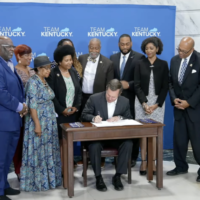A bill placing limits on no-knock search warrants in Kentucky passed out of a legislative committee on Thursday, nearly a year after Louisville police shot and killed Breonna Taylor during a middle-of-the-night raid.

Senate Bill 4 allows no-knock warrants to be issued when there is “clear and convincing” evidence of violent criminal activity, and requires for the warrants to be executed between 6 a.m. and 10 p.m. It falls short of an all-out ban on such warrants, something activists and some lawmakers have demanded since last year.
The bill is sponsored by Senate President Robert Stivers, a Republican from Manchester, who said on Thursday that Taylor was killed after “a series of bad police judgments.”
“No matter what an individual was involved in, they have the right to counsel, they have a right to face their accusers, they have a right to trial by jury and to bring witnesses on their behalf. This young lady was denied that,” Stivers said.
The measure isn’t as expansive as Breonna’s Law for Kentucky, Democratic Rep. Attica Scott’s proposal to totally ban no-knock warrants, create penalties for police who don’t wear body cameras and require officers to be drug tested after firing their weapons. It is similar to a ban enacted in Louisville last summer.
Scott’s bill has not been assigned to a committee. Meanwhile, Stivers’ is gaining momentum in the Republican-dominated legislature.
Sen. John Schickel, a Republican from Union and retired police officer, said search warrants need more scrutiny to protect personal liberties.
“To do that, every ‘i’ should be dotted and every ‘t’ crossed and there shouldn’t be any room for sloppiness, and quite frankly, having been on these sometimes, there is sloppiness, and that should never happen,” Schickel said.
The bill would require officers to go through more levels of approval to get search warrants, requiring them to consult with supervisors and local prosecutors, and require judges to legibly sign off on warrants, an issue raised in a KyCIR and WDRB joint investigation last year.
The bill would also create a penalty for perjury if officers make false statements while applying for search warrants.
Sen. Danny Carroll, a Republican from Benton and former police officer, said he supported the bill, but said the Taylor case “is not as cut and dried as many want the public to believe it was.”
Carroll said officers announced themselves before breaking into Taylor’s apartment, a point that has been disputed, and that police had to defend themselves once they were fired upon.
“We can make all the rules that we want to and we can do our very best to tighten things down, and we should, but there are going to be mistakes. Law enforcement officers are human, you can’t plan for every contingency that might happen in these high-risk situations,” Carroll said.
Three officers who were part of the raid on Taylor’s apartment last March fired more than 30 bullets after her boyfriend, Kenneth Walker, shot once at the people breaking down her apartment door. He later said he heard officers knock, but not announce who they were. The officers sought evidence related to a larger narcotics investigation, but police investigators did not find drugs or money in the apartment.
Taylor sustained multiple gunshot wounds and died in her hallway.
The bill passed unanimously out of the Senate Judiciary Committee on Thursday. Stivers said the bill might receive a vote in the full state Senate by the end of the week.






